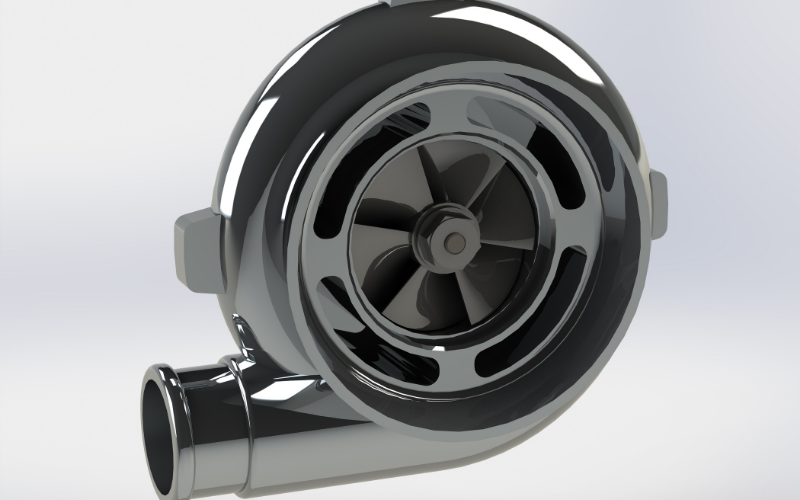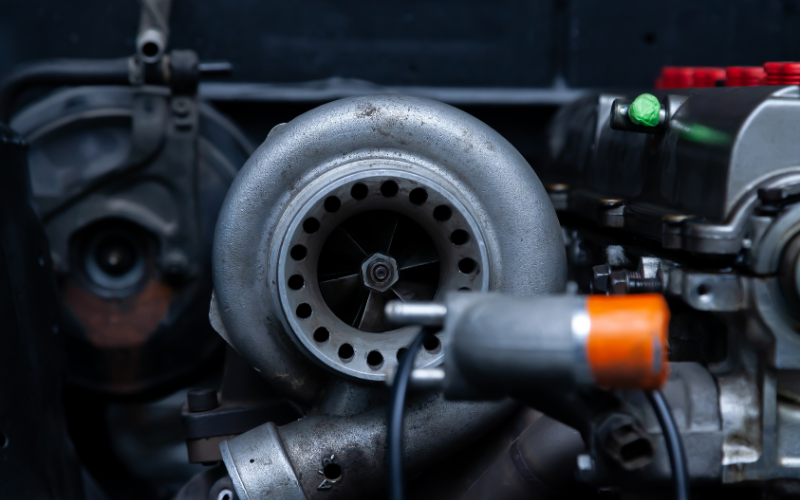When your diesel engine is running at its best when the turbocharger is doing its job, delivering extra power, efficiency, and performance. But when something goes wrong, the signs are often more noticeable than many drivers realize. Ignoring early symptoms of turbo failure can lead to expensive repairs, poor fuel economy, and even complete engine damage. By understanding the red flags, you can catch problems early, protect your vehicle, and avoid being stranded on the road. In this post, we’ll break down the most common diesel turbo failure symptoms you shouldn’t ignore, and what to do if you notice them.
Why Diesel Engines Need Turbochargers
Diesel engines are built for power, durability, and efficiency, but they rely heavily on turbochargers to reach their full potential. Unlike naturally aspirated engines, a turbocharger forces more air into the combustion chamber, allowing the engine to burn additional fuel more effectively. This results in greater horsepower, increased torque, and improved fuel economy without requiring a larger engine.
For diesel vehicles, turbochargers are especially important because they help deliver the low-end torque needed for towing, hauling, and heavy-duty performance. They also reduce emissions by ensuring a more complete burn of the air-fuel mixture, making modern diesel engines cleaner and more efficient. In short, without a turbo, most diesel engines would feel sluggish, less capable, and far less efficient.
Turbochargers benefit diesel engines in the following ways:
- Increased Power Output: By forcing more air into the combustion chamber, turbos allow the engine to burn more fuel efficiently, producing more horsepower.
- Higher Torque: Especially at lower RPMs, turbochargers provide the pulling power diesel engines are known for, making them ideal for towing and hauling.
- Better Fuel Efficiency: A turbocharged diesel can generate more power from the same amount of fuel, improving miles per gallon.
- Reduced Emissions: Turbos promote a more complete combustion process, helping lower smoke and harmful exhaust gases.
- Smaller Engine, More Performance: A turbo allows smaller diesel engines to match or even outperform larger naturally aspirated ones.
- Improved Driving Experience: Turbochargers deliver smoother acceleration and stronger overall performance.
Diesel Turbocharger Failure Symptoms
The turbocharger is one of the hardest working components in your diesel engine. Designed to boost power and efficiency, it spins at extremely high speeds and operates under intense heat and pressure every time you drive. While turbos are built to last, they’re not immune to wear and tear. Over time, issues such as poor lubrication, clogged air filters, or oil contamination can lead to premature failure.
The challenge for many drivers is that early signs of turbo trouble can be easy to overlook or mistaken for other engine problems. However, ignoring these red flags often leads to reduced performance, increased fuel costs, and even severe engine damage. By learning the most common symptoms of turbocharger failure, you can spot problems sooner, take action before they escalate, and potentially save thousands in repairs.
Common signs of turbocharger failure include:
1. Loss of Power
One of the first signs of turbo trouble is a noticeable drop in engine performance. Your vehicle may struggle to accelerate, feel sluggish at highway speeds, or lose the torque needed for towing and heavy loads. A weak or failing turbo cannot compress enough air for proper combustion, which directly impacts engine power.
2. Excessive Exhaust Smoke
If you notice unusual smoke during acceleration or idling, it’s a strong indicator your turbo needs attention. Different smoke colors can indicate specific turbo issues:
- Blue or gray smoke: This usually signals that oil is leaking into the turbo and burning in the exhaust.
- Black smoke: Often a sign of incomplete combustion caused by insufficient air supply from a failing turbo.
3. Whining, Whistling, or Siren-like Noises
A high-pitched whine or whistling noise under acceleration is a classic symptom of worn turbo bearings or damaged internal components. Sometimes described as a siren sound, this noise often becomes louder as the turbo struggles to spin efficiently. Ignoring it can lead to catastrophic turbo failure.
4. Check Engine Light or Warning Codes
Modern diesel vehicles are equipped with sensors that monitor turbo performance. A failing turbo can trigger a check engine light or specific diagnostic trouble codes. While the light itself doesn’t confirm turbo failure, it’s a clear signal to have your engine inspected immediately.
5. Increased Oil Consumption
A turbocharger relies on proper oil flow for lubrication and cooling. When seals or bearings start to fail, oil can leak internally, causing you to top off your engine oil more frequently. Low oil levels combined with a failing turbo can quickly escalate into major engine damage.
6. Poor Fuel Economy
When a turbo isn’t functioning correctly, the engine must work harder to produce the same amount of power. This inefficiency often leads to higher fuel consumption. If you notice your diesel suddenly requires more fuel for the same driving conditions, it may be time to inspect the turbo system.
7. Engine Overheating or Unusual Performance Behavior
A failing turbo can affect overall engine operation, sometimes causing overheating or erratic behavior under load. Reduced airflow and improper combustion make it harder for the engine to maintain optimal temperatures, potentially impacting other critical components.
What to Do If You Notice Turbocharger Symptoms

Catching turbo problems early can save your engine and prevent expensive repairs, but knowing the right steps to take is just as important. Here’s what to do if you suspect your diesel turbo is failing:
1. Stop Driving if Necessary
If you notice severe smoke, unusual noises, or a sudden loss of power, it’s best to pull over safely and avoid driving. Continuing to operate a diesel engine with a failing turbo can cause further damage to the engine, turbo, or exhaust system.
2. Check Engine Oil and Air Filters
Low oil levels, dirty or clogged filters, and oil contamination can contribute to turbo failure. Inspect your engine oil and air filters, topping off or replacing them as needed. While this may not fix a damaged turbo, it can prevent additional strain and worsening damage.
3. Schedule a Professional Inspection
Turbochargers are complex and high-speed components. A qualified diesel mechanic can perform a thorough inspection, check boost pressure, and diagnose whether the turbo can be repaired or needs replacement. Attempting DIY repairs on a failing turbo can lead to more problems.
4. Consider Turbo Maintenance or Replacement
Depending on the severity of the damage, your mechanic may recommend:
- Cleaning and servicing: For minor issues like carbon buildup or oil leaks.
- Rebuilding: Replacing worn bearings, seals, or housings.
- Replacement: For severe damage where repair is no longer cost-effective.
5. Prevent Future Issues
Once your turbo is repaired or replaced, routine maintenance can extend its lifespan:
- Change engine oil and filters on schedule.
- Use high-quality oil rated for turbo diesel engines.
- Avoid sudden throttle bursts when the engine is cold.
- Keep air intake and intercooler systems clean and free of debris.
Early detection and prompt professional care are the best ways to protect your diesel engine from turbo failure. Don’t ignore the warning signs, addressing them quickly ensures reliable performance, better fuel economy, and a longer engine life.
Remanufactured Turbochargers from HD Turbo
Your diesel engine works hard, and your turbocharger is one of its most critical components. Ignoring the warning signs of turbo failure can lead to poor performance, higher fuel costs, and expensive engine damage. The good news is that a failing turbo doesn’t have to mean a full engine replacement.
HD Turbo offers high-quality remanufactured turbochargers that deliver reliable performance at a fraction of the cost of a brand-new unit. Each turbo is carefully rebuilt to meet or exceed original specifications, ensuring optimal power, efficiency, and longevity for your diesel engine.
Don’t wait until a small issue becomes a costly repair. Restore your diesel’s performance and protect your engine with a remanufactured turbo from HD Turbo. Visit HD Turbo to find the right turbo for your vehicle and get back on the road with confidence.
Mission
We have ONE GOAL – provide you with a MORE POWERFUL and MOST RELIABLE turbocharger for years to come.
High Quality Products
Heavy-duty turbochargers are high-quality, produced in a state-of-the-art facility capable of balancing turbo components as well as whole rotating assemblies. Strict quality control.
Great Team
Our dedicated and detail-oriented team is always happy to help you – don’t hesitate to reach out with questions or comments.

 Authorized Dealer
Authorized Dealer